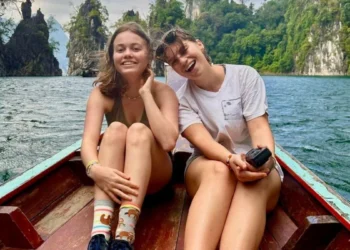Indian immigrants to the US have sought the American ideal of socioeconomic upliftment for decades, arriving as students or working professionals in search of better jobs, higher salaries, better education for their children, and other benefits. However, recent records indicate an increase in encounters with Customs and Border Protection, suggesting that new causes make Indians’ excursions more urgent.
An unprecedented number of Indian migrants have been attempting to cross the almost 2,000-mile land border between the US and Mexico in order to enter the nation illegally. Between October 2021 and August of this year, the CBP detained more than 16,290 individuals. The previous 2018 high was far lower, at 9,000.
These Indian nationals are escaping rather than merely moving. There are several causes for this. According to Deepak Ahluwalia, an immigration attorney who has defended Indian nationals in Texas and California, rising discrimination and persecution—often on the basis of religion, sexual orientation, or political allegiance—in Bharatiya Janata Party-ruled India is driving people to look for asylum in the US.
President Joe Biden relaxed the pandemic-era restrictions along the US-Mexico land border in April of this year, making the path appear to be simpler. People have optimism since the current US government appears to be far more welcoming of asylum seekers than the Trump administration was.
Expansion of already existing smuggling networks. For a door-to-door service that transports people from India to America, Indians often pay human traffickers between $20,000 and $75,000.
Those who try the voyage run the risk of being robbed, raped, and even killed while walking across perilous terrain in sweltering heat. In 2019, a mother went in search of water and found a six-year-old Indian daughter who had just crossed the border dead in the Arizona desert.
Asylum applicants must fill out a form after arriving in the US and wait to appear before a judge. A decision may not be made for years after several hearings. The percentage of Indians whose asylum requests are granted typically falls in the low single digits.
Those leaving their nations are easy victims for smugglers, who run “donkey flights”—a word taken from a Punjabi adage that means to jump from one location to another—to provide migrants with backdoor admission to a foreign country because sought-after legal avenues to reach the US are in scarce supply. It’s a strategy for taking advantage of immigration loopholes to enter a foreign country through a series of stops in other nations.
For instance, Indian nationals can enter the United Kingdom with a tourist visa for a Schengen-zone nation. They may fly to South American nations from the US.
You may get tutorial videos in Hindi or Punjabi regarding illegal border crossings by searching “USA Donkey” on YouTube. Even a party travelling through a forest in Panama to reach the border is depicted in one such video. Others, though, only find out about the procedure via friends and relatives.
An expert at the Migration Policy Institute in Washington, DC, Jessica Bolter, spoke to the BBC on the “ripple effect” as the cause of amplifying these services. She said that it “naturally expands” and attracts more immigrants. Of course, it can’t happen unless the migrants wanted to leave in the first place.
Manpreet, a 20-year-old Punjabi man who prefered to have just his first name used, describes his experiences as being typical of individuals who had previously travelled along the southern route. He was a vocal critic of India’s governing BJP (Bharatiya Janata Party), and after being persecuted for his political views, he left the country.
In a BBC interview from California, Manpreet recounted, “I took a bus from Ecuador to Colombia, then from Colombia, I took a bus to Panama. “From there, I travelled by boat to Nicaragua and Guatemala, then to Mexico and the United States.”
Rajkumar Hirani’s upcoming film “Dunki,” starring superstar Shahrukh Khan, is anticipated to tell the tale of a Punjabi kid who enters Canada using one of these donkey flights.











